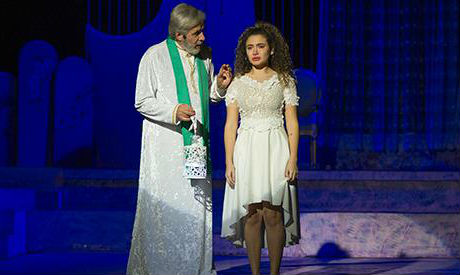Sufism has been on the rise for several years, inspiring many theatre makers. Let us have a look at select plays that have been staged across Egyptian theatres, scoring significant successes.
Over the past decade, Egyptian as well as international eyes have turned to Sufism for inspiration in creative work. Numerous films, books, theatre plays either tackled Sufi topics and history or interwove Sufi philosophy into their narratives.
Egyptian theatre has witnessed a significant increase of plays — by Egyptian playwrights or adopted from foreign texts — that revolve around Sufism, its characters and concepts.
We may start by moving back to year 2013, and the staging of An El-Ochaq (About Lovers), a play in which director Hani Afifi brought together poetic discourse and the philosophy of Andalusian Ibn Hazm as captured in his treatise on love The Ring of the Dove, yet presented against a contemporary background.
Karim Arafa's adaptation of the original text capitalised on Hazm's answers to the questions raised by the characters. The play's dialogues mixed classical Arabic and Egyptian dialect.
To accentuate the dramatic and romantic aspect of the show, the director replaced some of Ibn Hazm's poems with songs by Oum Kalthoum, performed by the actors themselves or by soloists from the House of Oud in Cairo, and accompanied by musical improvisation.
Performed at the Mamluk Palace of Emir Taz in Al-Khalifa district, the performance benefited from the Islamic architecture, and proved to be a great success of the season with many reruns.
Another Sufi-inspired play, one that stayed on Al-Talia Theatre's stage for three years, was Kaannak Tara (As You See It) directed by Maher Mahmoud.
The play took inspiration from the thoughts of the Prophet Mohammed focusing on finding solutions to many current human problems. The play also revives the historical figure of Uwais Al-Qarani, a 7th century pious man, performed by Mohamad Younes.
In Kaannak Tara, the theatre hall was transformed into a makeshift cafe, where the audience was seated on chairs on both sides, with small coffee tables. Nearby we could see a mosque and a church.
The play revolves around a young man named Sherif who frequents the place in search of peace, something he finds in the Sufi atmosphere created at the location. It is there that he meets his fiancée Nada.
In the play, we see how the inhabitants of the district follow the sheikh who guides them in life. Among the topics tackled by the sheikh are marriage among young people, the gap between parents and children, the monopoly of goods, the manipulation of businessmen, terrorism, etc.
The director opted for music to better convey his message. He thus passes from Sufi songs to the praise of the prophet and to folk songs.

‘The Lovers' Messages’
If certain shows touch on Sufism through music and singing, or by being inspired by Sufi philosophy, the play The 40 Rules of Love, which premiered in 2017 and is still performed at Al-Salam Theatre, took advantage of the popularity of Turkish author Elif Shafak's Sufi My Love while taking the title of another novel by the same writer.
Directed by Adel Hassan, the adaptation for theatre was done by Rasha Abdel-Moneim.
The play puts the spectator at the forefront of the Sufi universe. The play tells the story of two great Sufi masters, Shams Al-Tabrizi (played by Bahaa Tharwat) and Jalal Al-Din Al-Rumi (Ezzat Zein). It sends us a message of peace and love, while evoking thorny topics related to superficial beliefs.
The director highlights the spiritual aspect of the story, taking an angle that stresses condemnation of intolerance and violence. The show addresses false concepts about Islam and goes beyond usual slogans on the renewal of religious discourse.
Throughout the play, Shams Al-Tabrizi dictates to his disciple the 40 rules of divine love. The dialogues of the two Sufis are in classical Arabic, overlapping with the songs and mystical dances of the whirling dervishes of Al-Mawlawiya Troupe.
Meanwhile, on the stage of the Miami Theatre in Downtown Cairo, director Mohamed Ibrahim offers a magic potion to resolve the difficulties of love relationships. The answer comes in Rassael El-Oshaq (The Lovers' Messages), a play based on precepts of love from the Sufi poet Rumi.
Separate sketches summarise the different problems of the contemporary couple where the past mixes with the present.
The character of Rumi is on a journey into today's world. He meets young people and tries to help them understand what love really is. He always supports the woman, considering her a divine, tender and fragile creature, saying: "Love exists for women."
*This article was originally published in French in Al-Ahram Hebdo's 25 December 2019 issue
For more arts and culture news and updates, follow Ahram Online Arts and Culture on Twitter at @AhramOnlineArts and on Facebook at Ahram Online: Arts & Culture
Short link: